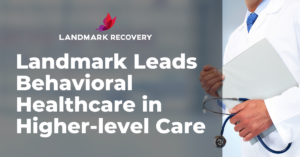
Many drug and alcohol recovery centers fear being in a position where they have a patient with health problems that they may not be able to handle. As a result, lots of prospective patients make the incredibly difficult choice to pursue rehabilitation but get denied at the door, which only provides new excuses to keep using drugs or alcohol.
“My philosophy is that barriers to entry for substance use treatment should be incredibly low,” said Dr. Jason Kirby, chief medical officer at Landmark Recovery. “If people want help, we should be able to find a way; we should figure it out.”
Read about other barriers to addiction treatment.
Many patients commonly don’t meet the criteria to enter a residential treatment facility. Typically, staff at these facilities do at least have clinicians who supervise patients. Those clinicians are the ones who construct a facility’s curriculum in most cases. Some facilities also have nursing staff, and the better facilities will even have doctors. The reason doctors are not universal, though, is because not all treatment centers are required to have a physician on staff. There’s a strong caution against admitting patients who have medical complications into the facilities for behavioral health treatment, especially for the facilities without the necessary medical staff.
How Landmark Recovery’s Breaking Barriers to Change
Kirby is also co-chair of the American Society of Addiction Medicine’s (ASAM) Levels of Care Certification Committee, which is bridging the gap between behavioral health and the rest of the healthcare industry to enhance the ability of addiction treatment centers to better define what universal characteristics each level of care should have nationwide to create a continuum and keep congruency in addiction treatment.
About five years ago, ASAM developed a Levels of Care Certification Program, which certifies residential treatment programs across the country. The three levels are based on the availability of staff and the amount of services they can render. All Landmark Recovery facilities hold the highest level of certification, which means they have both 24-hour clinician supervision and 24-hour nursing supervision. Landmark also has in-house providers that offer medical services to patients at least eight hours a day, seven days a week.
“Even we as a company, with all the improvements to staff that we’ve made, still struggled with letting certain people in because it’s the culture of the industry,” Kirby said.
About five months ago, Kirby took action to broaden the spectrum of whom Landmark could help so that the company could offer addiction treatment to more people with medical and psychiatric issues.
“I needed to put staff, training and supplies in each of our facilities in order to deal with any medical or psychiatric problems that may arise,” Kirby said. “I couldn’t ask you to perform a service if you didn’t have the tools that you needed in order to execute, right? That’s where this whole emergency protocol came about.”
The Solution: Breaking Barriers
Landmark’s new medical emergency protocol entails the optimization of staff, enhancement of training and the acquisition of supplies. For optimizing staff, Kirby focused on stacking Landmark’s nurse-to-patient ratios and scheduling eight to 10 hours of dedicated provider time in each treatment center to oversee care of patients’ withdrawal syndromes, biomedical and psychiatric needs.
As far as training is concerned, Landmark provides advanced cardiac life support training to all nurses and clinical staff, which no one else in the industry is doing. Landmark also provides basic lifesaving certification to any personnel who have direct patient care responsibilities. That’s yet another action no one else in the industry has taken. Advanced cardiac life support (ACLS) is a certification that’s offered for hospital systems.
“So essentially, I am trying to prepare our organization to be able to deal with sicker people who might have similar episodes and urgent issues that come up in hospital systems,” Kirby explained.
Every Landmark facility was supplied emergency medications and carts stocked with supplies like oxygen tanks, IV fluids, IV tubing and airways. Landmark implemented random training drills in June on what will be a monthly basis. This is to ensure personnel retain the knowledge earned in the training Landmark gives its staff.
The emergency medications and tools include intramuscular injections of Ativan and antipsychotics to hopefully break a psychotic episode. Landmark will also have its ACLS protocol medications as well as heart monitors located on each crash cart where personnel can identify arrhythmias. The organization has medicines to deal with those arrhythmias and has airway and oxygen supplies needed to handle breathing issues.
Training Has Already Begun
“We’re dealing with two potentially deadly withdrawal syndromes,” Kirby said. “Alcohol withdrawal and benzodiazepine withdrawal can be deadly in about two to five percent of folks, statistically speaking. And we need to make sure that we prepare for that. We do have events that do happen in our facilities. People seize; they go into seizures.”
Landmark has identified eight specific, emergency scenarios that can and do happen in a residential drug and alcohol treatment center. Some examples of that require ACLS protocol like heart arrhythmias, opioid overdoses, withdrawal seizures, first-aid and patient falls. The organization also has a behaviorally aggressive patient drill that it now runs, in addition to a psychotic patient drill.
Every month, Landmark’s treatment centers will have a random medical emergency drill. Each facility will run the drill on a different, unannounced day. Nobody at the facility except for the director of nursing will be aware that the drill is coming. Staff response will be monitored, including how long it takes to notice the condition and how long it takes to respond with all the correct supplies.
“And then also going through the algorithms,” Kirby said. “For each case that we’ve built, we have steps; we have an algorithm. Our staff are going to have to achieve 80% of those steps in order to pass that drill. If they don’t, they’ll have to repeat it.”
Landmark Leads the Behavioral Care Space
There’s been a big push over the last decade in the industry to develop an accreditation system to integrate behavioral health with the rest of the healthcare continuum. That would standardize the industry such that, an organization opening a treatment facility in Tennessee would be similar to another opening a rehab location in Ohio. They would share similar staffing models, similar policies, similar space and similar hours, among other things.
“Without an accreditation system, there’s no incentive to have treatment facilities do it because it costs money,” Kirby said.
That’s been the trend, and that’s actually coming to fruition. Most modern units opening up today have 24-hour nursing as well as some type of affiliation with providers. Some hire providers to provide medical services in-house whereas others enter contracts with nearby primary care practices who will deal with any issues that might come up.
“So if somebody, for example is a poorly controlled diabetic, that there’s folks on staff, nurses, who are trained in diabetes management and providers that are trained in diabetes management to be able to offer services to get blood sugar stabilized at the same time that they engage in the behavioral health curriculum to change the behaviors toward substances,” Kirby said.
Either way, the industry is slowly navigating toward a system that guarantees a catchall for issues behavioral health facilities can’t handle. The overwhelmingly pervasive trend right now, however, remains that the sicker people are, the less likely they are to be admitted to these facilities.
If you or someone you know is dealing with substance abuse issues call Landmark Recovery at 888-448-0302 today to speak with an admissions specialist.

Choose Recovery Over Addiction
We're here 24/7 to help you get the care you need to live life on your terms, without drugs or alcohol. Talk to our recovery specialists today and learn about our integrated treatment programs.





